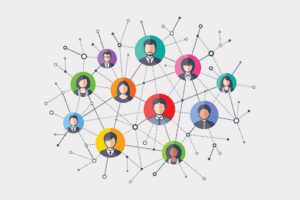“As we look ahead into the next century, leaders will be those who empower others.”-
Bill Gates[1]

As a young person growing up in Nigeria, I was exposed to four kinds of leadership that had influence on my life; I have spent much of my life trying to unlearn these qualities.
Unlearning these leadership skills and styles is important in aiding who I am becoming as a leader in this ever-evolving world.
This essay will evaluate leadership in Nigeria and the power of coaching in cultivating collective intelligence and emphatic leadership. It will focus on two key coaching theories centred around “Thinking Environment” and “Co- Active Coaching”. In this essay I discuss my creation, a hybrid of these two theories, as a means of solving what I personally consider as leadership problems in Nigeria.
The first leadership style I came in contact with was with my parents. I come from a home where to an extent freedom and free will is allowed.
My father, a Muslim, allows for the occasional Sunday school services that my mother will take us to. This is note-worthy because not only is Nigeria a patriarchal society, it is also a society that is centred around the man’s ownership of the woman and the children.
However, this freedom of will was cut short with the realisation of my sexuality, and that the need for me to hide and/or deny it means more to my parents than the support I need to live an authentic life.
I chose not to hide it, and in doing so, realise that, oftentimes, leadership is about choice. And that sometimes, the choices are not in favour of everyone.
From age six to eighteen, I encountered another form of leadership through my teachers. Theirs is the leadership that brings knowledge and understanding.
This leadership also introduced me to the principle of the stick and the carrot. Through this leadership, I learnt about accountability, reward, punishment, and the “Importance of Being Earnest”
However, this leadership also introduced me to the trauma of extreme punishment that leaves scars, fear, and doubt.
As I encountered religion, I was exposed to another set of leaders, the pastors in my church. They were to nurture both my physical and spiritual growth. While they helped my younger self to develop in a way that allowed me to conform to the expectation within the society, it took away my ability to explore my individuality and connect that with the experience of others.
As a young child, I needed these styles of leadership in my life, not because they were the most appropriate, but because they were best suited for my nurturing in the setting I existed in.
However, as an adult who worked within the employment market in Nigeria before leaving for the UK, I realised that the style of leadership that operates within Nigeria is not one that allows for proactive engagement.
The leadership that I experienced and that still prevails, fails to create a thinking environment to enable collective intelligence and empathic leadership.

For the sake of this essay, I will define collective intelligence as, ‘the ability of systems or leaders to use empathic leadership as a tool to tap into the ability of its followers’ to solve problems, and in the creation of systems that work’
I am going to focus specifically on Nigeria in this essay, simply because it is the setting in which I most experience the type of leadership I will be discussing.
To understand how important is the need for collective intelligence and empathic leadership in Nigeria, I want to give a brief overview of the country, and the crisis which the lack of leadership which I sought, is creating there.
As of 2020 the estimated population of Nigeria stood at over 200million[2] of which more than 60% are aged 15-30 years[3]. The country is facing challenges, some of which have been compounded by the coronavirus pandemic.
Nigeria’s unemployment rate stands at over 33.3%[4] and in the age range 15-35 is more than 40%.[5] Further, the underemployment rate is around 15%.[6]
The country is being projected to be the third most populous country in the world by 2050[7], creating overpopulation in a world facing one of its greatest peacetime challenges, climate change.
Given this plethora of challenges, one thing is clear; there is a need for transformational leadership that will enable the collective intelligence of Nigerians.
This is where coaching comes in. My coaching idea is simple. It is about using the dynamic power of Nancy Kline’s ‘Thinking Environment’,[8] mixed with the transformational effect of ‘Co-Active Coaching’[9] to create a hybrid I call the “Co-Active Thinking Environment”.
As a coaching student, I found these two approaches very relatable, but it is no surprise that I do. As a young man growing up in a society like Nigeria where the essence of leadership is more directive than collaborative, and where power is performative, it hit me that the reason I have not been able to adequately tap into my potential as a person is mainly because of the environment I was socialised in.
For an individual to be at their optimum potential we need to create “the ground conditions necessary for sustainable and transformative change in all…. relationships, whether formal or informal, from the act of consciously creating co-active relationships; relationships that are collaborative, cooperative, co-created, active, and engaging and that yield actions and learning”.[10]
For this kind of relationship to happen as part of the process of cultivating collective intelligence and empathic leadership, there are key factors that must be in place – Nancy Kline refers to them as the “The Ten Commandment of a Thinking Environment”.[11]
The thing about these commandments is how easy but effective they are, and how unaware leaders are of the impact they can create – even more so in a coaching environment where there is only a very limited culture or awareness of coaching.
- Attention: one key element of Thinking Environment is the ability to listen to what is being said and beyond. This listing has to be done within a safe environment that allows for respect and collaborative interest, one that allows for equal participation between the listener and speaker.
- Incisive Questions: All the leaders I encountered while growing up had one thing in common: a lack of ability to ask questions to unlock unlimited ideas and remove limiting beliefs.
- Equality: This is the idea of treating each other as collective intelligent thinking partners, by eliminating hierarchy.
- Appreciation: Appreciation as a tool for cultivating collective intelligence, allows for ideas that are liberating, as well as intentionally provocative.
- Ease: Collective intelligence and empathic leadership skills understand the importance of creating an environment of ease that permits the ability to think.
- Encouragement: An idea that sets up collaboration rather than competition.
- Feelings: An environment that allows for empathic leadership, permits vulnerability and the expression of feelings.
- Information: A leader gives information in a way that is clear, and also request information in a way that is equally clear.
- Place: Be it office, home, school or any other place, a leader using the co-active coaching is very aware that creating a safe place for people to explore their potential is not just necessary, but important in building the possibility of self-worth and growth
- Diversity: A leader not only understands seen diversity and its importance, but also unseen diversity, and creates an environment that allows each to flourish without judgement.
However, in addition to the above, cultivating collective intelligence by an empathic leader cannot be achieved if it is lacking in the essentials of co-active coaching.
For a thinking environment to achieve the optimum impact, it will have to be complimented by the principles of:
- Active listening: While incisive questioning helps to unpack and unlock creativity and intelligence, it is the art of active listening that allows for the empathy which allows someone to flourish.
- Curiosity: Nothing excites active listening more than curiosity. A leader who is keen to enable vulnerability, an environment of ease and yet be able to provide information that is empowering, must develop a sense of positive and proactive curiosity.
- Accountability: This is the essence of leadership. The ability of a leader to take ownership of both the good and the bad of the team while at same time allowing for collective responsibility, is what sets aside a leader determined to support and cultivate collective intelligence, as opposed to one who just wants to get the job done.
In Nigeria coaching is not part of HR’s culture for professional growth. Coupled with the reality that traditional expectation of leadership means someone who is often mean, knows it all, and is authoritarian and powerful, there is no more impactful coaching technique than “Co-Active Thinking Environment”.
There is a vacuum in Nigeria both in politics and business for a transformational leader that is empathic, and revolutionary.
Using the “Co- Active Thinking Environment” approach will unlock the potential of the curious talented young people, enabling the emergence of leaders who are interested in development and growth.
It will transform the start-up market in Nigeria which accounts for more than 15% of African start-ups[12]. It will birth political leaders that invest in people and infrastructure.
Such deliberate and intentional intervention will not only turn Nigeria around, but position it as a key play in the ever-evolving global business and politics. This is the intention for my coaching.
************************************************************************************************************************************************
NB- This article was submitted by Bisi Alimi as part of his graduation requirement for the mastered program at Meyler Campbell and the it was edited by Anne Scoular
***********************************************************************************************************************************************
Bibliography
Kline, N (1999). Time to Think; Listening to Ignite the Human Mind. Octopus Publishing Group
Lencioni, P (2002). The Five Dysfunction of a Team. Jossey- Bass, A Wiley Imprint
Kimsey-House, H., Kimsey-House, K., Sandahl, P., Whitworth, L. (2018). Co- Active Coaching; The Proven framework for transformative conversation at work and in life. Nicholas Brealey Publishing.
Wallace, N(2019). Bill Gates: “Tomorrow’s Leaders Will be Those That Empower Others” RealLeaders. https://real-leaders.com/bill-gates-tomorrows-leaders-will-be-those-that-empower-others/
World Population Review (2019). UN World Population Prospects (2019 Revision). https://worldpopulationreview.com/countries/nigeria-population
Ade Ajayi, J.F. (n.d.) Federal Republic of Nigeria. https://www.britannica.com/place/Nigeria/Languages
Olurounbi, R (2021). “Nigeria Unemployment Rate Rises to 33%, Second Highest on Global List” Bloomberg. https://www.bloomberg.com/news/articles/2021-03-15/nigeria-unemployment-rate-rises-to-second-highest-on-global-list
Akinwotu, E (2021). “Young, qualified and barely scraping by – inside Nigeria’s economic crisis”. The Guardian Newspaper. https://www.theguardian.com/world/2021/jun/14/young-qualified-and-barely-scraping-by-inside-nigerias-economic-crisis
Isiugo-Abanihe, U (2020). “Why Nigeria can’t fix its development agenda: and where the solutions lie”. The Conversation. https://theconversation.com/why-nigeria-cant-fix-its-development-agenda-and-where-the-solutions-lie-123638
Olasoji, T (2021). “Nigeria has the most startups in Africa but falls short on other critical metrics”. The Quartz magazine. https://qz.com/africa/2012780/nigeria-ranks-first-in-african-startups-but-faces-challenges/
[1] https://real-leaders.com/bill-gates-tomorrows-leaders-will-be-those-that-empower-others/
[2] https://worldpopulationreview.com/countries/nigeria-population
[3] https://www.britannica.com/place/Nigeria/Settlement-patterns#ref55292
[4] https://www.bloomberg.com/news/articles/2021-03-15/nigeria-unemployment-rate-rises-to-second-highest-on-global-list
[5] https://www.theguardian.com/world/2021/jun/14/young-qualified-and-barely-scraping-by-inside-nigerias-economic-crisis
[6] ibid
[7] https://theconversation.com/why-nigeria-cant-fix-its-development-agenda-and-where-the-solutions-lie-123638
[8] Nancy Kline, 1999. Time To Think: Listening To Ignite The Human Mind, UK Octopus publishing group LTD
[9] Kimsey-House, Henry, Karen Kimsey-House, and Phil Sandahl. 2011. Co-active coaching: changing business, transforming lives. Boston, MA: Nicholas Brealey Pub.
[10] Page 8, Kimsey-House, Henry, Karen Kimsey-House, and Phil Sandahl. 2011. Co-active coaching: changing
business, transforming lives. Boston, MA: Nicholas Brealey Pub.
[11] https://www.timetothink.com/thinking-environment/the-ten-components/
[12] https://qz.com/africa/2012780/nigeria-ranks-first-in-african-startups-but-faces-challenges/
